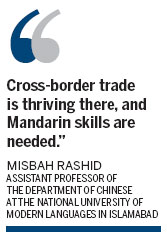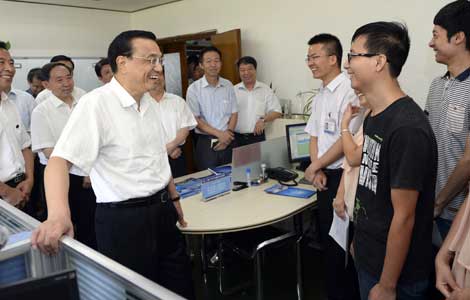Mandarin becomes priority
Updated: 2013-08-19 13:08
By Zhang Yunbi in Islamabad (China Daily)
|
||||||||

|
Shameel Farhan (left), a 39-year-old Pakistani security officer, attends a Mandarin course at the National University of Modern Languages in Islamabad in June. Photos by Zhang Yunbi / China Daily |

Editor's note: China Daily continues its reports from neighboring countries in an eff ort to provide insight into topics relevant to China. In the second part of our Pakistan series, we examine Mandarin teacher training and Pakistani popular culture.
Beijing, Islamabad cooperate to boost Chinese language lessons
China is training more Mandarin teachers and building more language schools in Pakistan to meet the growing demand for Mandarin speakers.
A vice-president has been named for a second Confucius Institute in Pakistan, which is under construction, to help China achieve its goal of training 1,000 more Mandarin teachers in the country, sources said.
Eliminating the language barrier will benefit bilateral trade, which is already booming, and boost the country's technology sectors, observers said.
Pakistan's trade with China surpassed $12 billion last year, a year-on-year increase of 18 percent.
Learning Mandarin is now "very promising for those who want to make a fortune in Pakistan", said Misbah Rashid, an assistant professor of the Department of Chinese at the National University of Modern Languages in Islamabad.
"There is a growing number of Chinese enterprises running businesses here," she said, adding that the majority of her students found jobs in the Pakistani branches of Chinese companies or government agencies.
Established in 1970, the country's leading language university once taught Mandarin to only 30 students in Rashid's department.
But today the figure is more than 200, and the diploma courses in Islamabad now cover bachelor's, master's and doctoral degrees on Mandarin studies.
Many Pakistani students who become Mandarin teachers return to their hometowns that border the Xinjiang Uygur autonomous region.
"Cross-border trade is thriving there, and Mandarin skills are needed," Rashid said.
The university, a leading Mandarin teaching academy in Pakistan, now has 12 teachers in the Mandarin department, including four from China.
The university is also home to the first and only Confucius Institute in Pakistan, which was jointly established with Beijing Language and Culture University in 2007.
The two universities maintained exchanges for decades and cultivated teachers like Rashid and many of her fellow faculty members.
Plan for 1,000 teachers
"I spent four years as an undergraduate student at Beijing Language and Culture University and another two years studying for a master's degree at Peking University in Beijing," Rashid said.
The training of proficient Mandarin teachers like Rashid is expected to accelerate because Premier Li Keqiang announced a five-year plan to train 1,000 more in Pakistan in May.
Zhou Jieming, president of Sichuan Normal University, said he was thrilled to witness "the landmark agreement" signed in Islamabad for the future Confucius Institute, to be co-founded by his college and the University of Karachi. "During our trip in May to Pakistan to witness the signing, we saw the thirst of local youths to learn more about Chinese culture and the language," Zhou said.
Li met with Pakistani Prime Minister Nawaz Sharif in Beijing on July 5, and they agreed to "implement the training plan of 1,000 Mandarin teachers".
The vice-presidential nominee from the university passed the qualification exam at the Confucius Institute Headquarters in Beijing in June, and is now being trained, said Yang Yingyu, vice-dean of the university's College of International Education.
The best way to achieve the goal of 1,000 Mandarin teachers is to help the University of Karachi build its own Chinese department, then "cultivate more native teachers to master Mandarin first before they train more locals", Yang said.
Shameel Farhan, a 39-year-old security officer enrolled in a six-month certificate class at the National University of Modern Languages, always attracts attention for his fluency in basic Chinese words.
He was in China for four years as an international student before the current class started in March. In 2005, he graduated from Northwestern Polytechnical University in Xi'an after his postgraduate study on materials science and engineering.
"You see, China is the fastest growing economy nowadays in every part of life in every field. We are a neighboring country of China, so we should learn how China developed so quickly," Farhan said.
About 8,000 Pakistani students like Farhan are already studying in China, and AFP quoted Pakistan's embassy in Beijing as saying "thousands more" are preparing to join them.
Farhan said he will again go to the Chinese university for doctoral studies in materials science after the class is concluded.
Instead of working in China or working for some Chinese companies in Pakistan, he said: "I will come back and continue my studies, so I can excel in my field."
Yang Ting in Beijing contributed to this story.
zhangyunbi@chinadaily.com.cn
(China Daily USA 08/19/2013 page6)

 Ride to fly on the top of mountains
Ride to fly on the top of mountains
 Nadal beats Isner to win first Cincinnati crown
Nadal beats Isner to win first Cincinnati crown
 Wild Africa: The new attraction to Chinese tourists
Wild Africa: The new attraction to Chinese tourists
 Azarenka beat Williams for Cincinnati title
Azarenka beat Williams for Cincinnati title
 500th eruption of Sakurajima Volcano in 2013
500th eruption of Sakurajima Volcano in 2013
 A cocktail that's a treat for the eyes
A cocktail that's a treat for the eyes
 Private sector to care for the elderly
Private sector to care for the elderly
 Be innovative, Li tells graduates
Be innovative, Li tells graduates
Most Viewed
Editor's Picks

|

|

|

|

|

|
Today's Top News
Iran signals willingness to resume nuclear talks
Baby formula sales to be shifted to pharmacies
CIA document release acknowledges Area 51
36 killed in Egypt's prison truck escape attempt
Be innovative, Premier Li tells graduates
Onus on US to improve military ties
Trustee council may be answer for reforming
40 killed as floods ravage NE China
US Weekly

|

|








